
British/American Differences: Understanding the Key Differences Between English Variants
English is a global language and has two main variants – British English and American English. While they share a common origin, the two versions have distinct differences that have evolved over time. Understanding these differences can help you navigate language barriers, communicate effectively, and avoid confusion. In this article, we will explore the key differences between British and American English.
I. Pronunciation
A. Vowel Sounds
B. Consonant Sounds
C. Stress and Intonation
II. Spelling
A. Words with Different Spellings
B. Words with the Same Spelling but Different Meanings
III. Vocabulary
A. Different Words for the Same Thing
B. Different Words for Different Things
C. Phrasal Verbs
IV. Grammar
A. Verb Forms
B. Prepositions
C. Collective Nouns
V. Culture and Usage
A. Dates and Numbers
B. Expressions and Idioms
C. Formality and Informality
I. Pronunciation
One of the most notable differences between British and American English is in the way words are pronounced. Here are some key areas of difference:
A. Vowel Sounds
British English tends to use a longer vowel sound than American English. For example, the word “bath” is pronounced with a short “a” in American English but a longer “a” in British English.
B. Consonant Sounds
There are also differences in the way certain consonant sounds are pronounced. For example, the “r” sound is more pronounced in American English than in British English.
C. Stress and Intonation
The stress and intonation of words and phrases can also differ between the two variants. In British English, the stress is often on the second syllable, whereas in American English it is often on the first syllable.

II. Spelling
Spelling is another area where British and American English differ. Here are some examples:
A. Words with Different Spellings
Some words are spelled differently in British and American English. For example, “colour” is spelled with a “u” in British English but without a “u” in American English.
B. Words with the Same Spelling but Different Meanings
There are also some words that are spelled the same but have different meanings depending on whether you are using British or American English. For example, “biscuit” means a small, sweet cake in British English but a type of bread in American English.
III. Vocabulary
There are many differences in vocabulary between British and American English. Here are some examples:

A. Different Words for the Same Thing
For example, “lorry” is used in British English for what Americans would call a “truck”.
B. Different Words for Different Things
Another example is “apartment” which is used in American English for what British English speakers call a “flat”.
C. Phrasal Verbs
Phrasal verbs are also an area where the two variants differ. For example, “get on” means to board a train or bus in British English but to have a good relationship with someone in American English.
IV. Grammar
Grammar is another area where British and American English differ. Here are some examples:

A. Verb Forms
There are differences in the use of verb forms between the two variants. For example, in British English, “have got” is often used instead of “have” to mean “possess”.
B. Prepositions
Prepositions can also differ between the two variants. For example, in American English, you might say “on the weekend” whereas in British English you would say “at the weekend”.
C. Collective Nouns
Collective nouns, such as “team”, “family”, and “government”, can also be treated differently in British and American English. In British English, collective nouns are often treated as plural, while in American English they are often treated as singular.
V. Culture and Usage
Finally, there are cultural and usage differences between the two variants of English. Here are some examples:
A. Dates and Numbers
Dates and numbers are formatted differently in British and American English. For example, in American English, the date is often written as month/day/year, while in British English it is written as day/month/year.
B. Expressions and Idioms
Expressions and idioms can also differ between the two variants. For example, in British English, “I haven’t got a clue” means “I don’t know”, while in American English, “I haven’t got a clue” is not a common expression.

C. Formality and Informality
Finally, there can be differences in formality and informality between the two variants. For example, in American English, it is common to use contractions such as “don’t” and “can’t” in both formal and informal situations, while in British English, contractions are generally considered more informal and may not be used in formal settings.
In conclusion, while British and American English share a common origin, there are many differences between the two variants. These differences can be found in pronunciation, spelling, vocabulary, grammar, and culture and usage. By understanding these differences, you can communicate more effectively and avoid confusion when speaking with someone from a different English-speaking country.
JustPractice is another useful online resource for English language learners. JustPractice offers a free platform where learners can practice their speaking and listening skills with native English speakers. It’s a great way to get real-world speaking practice in a relaxed and informal setting. Here’s the link to the website: https://justpractice.online/